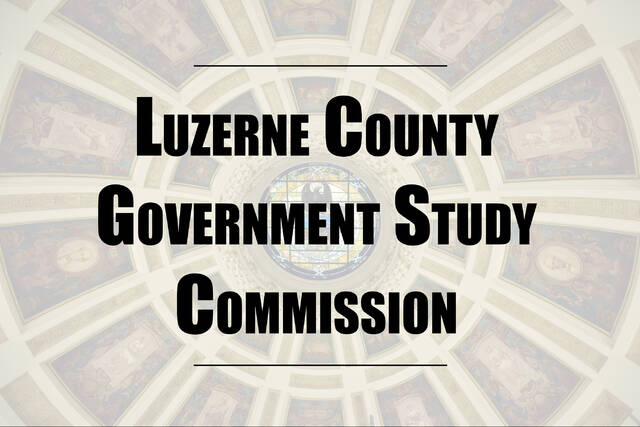A Luzerne County Government Study Commission majority voted Monday to approve the final proposed new county home rule charter that will be placed before voters for possible adoption Nov. 4.
The commission members in support of the revised charter: Chairman Ted Ritsick, Vice Chairman Vito Malacari, Secretary Matt Mitchell and Stephen J. Urban.
Commission Treasurer Cindy Malkemes and member Mark Shaffer voted against the proposed charter.
Tim McGinley, the remaining commission member, chose not to take a position and abstained.
Before voting, commission members spoke about some of the reasons for their positions.
Urban maintained the proposal is a “vast improvement” over the current charter that took effect in January 2012.
It gives more power to council members — the representatives elected to determine how the county moves forward, he said, adding that elections have consequences.
The bipartisan commission of three Republicans and four Democrats found “common ground” and reached majority consensus to enhance a home rule structure for the county’s future, he said.
“I think this is where we need to be today,” he said of the revision.
Shaffer said his main concern when running for the commission was to keep elected officials off the county election board, and the proposal’s allowance of that possibility has convinced him to vote no.
Legal analysis from commission solicitor Joseph J. Khan, of Curtin & Heefner LLP, had said the Pennsylvania Election Code, or Title 25, is clear that election boards have employee appointment authority and other responsibilities currently performed by this county’s administration.
As a result, a commission majority concluded council must have flexibility to change from an all-volunteer, five-citizen board if the board’s powers must increase to comply with state election law, which could include authority to hire the election director, choose the voting system and prepare annual election budgets.
The proposed charter would keep the board at five members, require at least two Democrats and two Republicans and allow the four council-appointed members to then choose someone to serve in the fifth seat — all provisions in the charter.
After 23 months, the structure could be changed to allow employees and/or council members to serve on the board if a council majority-plus-one determines such an alteration is warranted.
Shaffer also said he does not like the proposed charter’s alteration of the ethics commission because the composition could change to council members in the future.
Under the current charter, the county district attorney, controller, county manager or his/her designee and two council-appointed citizens (one Democrat and one Republican) serve on the commission that enforces the council-adopted ethics code.
The proposed charter would keep the current commission structure plus two more citizens for at least the first two years. A majority-plus-one council vote would be required if council wants to change the composition after this two-year trial period.
The proposed charter also would create an advisory committee, including citizens, that would make nonbinding recommendations on ethics code changes to council.
Shaffer said he may be considered a cynic and “too pessimistic,” but he believes charters must be written “to protect against the worst.”
That said, he acknowledged there are significant improvements in some other parts of the charter.
Mitchell said he believes the commission “did a nice job trying to modernize everything with this charter.”
The proposal is not as rigid and gives council more flexibility to “address issues as they arise,” he said.
Mitchell noted many compromises were required, with multiple votes on some issues. Although it is not everything he wanted, he was pleased with the final document.
Malkemes echoed Shaffer’s views, saying she was “dismayed” with the final decisions on the election board and ethics commission, which were both issues she was “passionate about.”
McGinley said the current charter aimed to take politics out of the government as much as possible by having daily operations handled by an appointed manager. He asserted some changes went against this premise, such as a requirement for the manager to obtain council approval to terminate the chief solicitor and chief public defender.
A commission majority had concluded council involvement in these two positions would provide an added check and balance.
On the other hand, McGinley acknowledged there were still a “lot of good ideas” in the proposed charter and said he was unsure how to vote after spending the entire day reviewing and contemplating.
Malacari said change and evolution are necessary, and he is confident this proposal will “greatly move the county forward.”
The proposal’s reduction of council from 11 to nine members will place more “weight and accountability” on each member, he said.
A requirement for the county to create a public defender’s office advisory board — the second such body among state counties — would allow more community input in the justice system, he said.
Malacari said the proposal does not get rid of the election board or ethics commission. Instead, a council will decide their composition in the future, which could be the same or different.
Ritsick said the proposal preserves the foundation of the current charter — greater accountability, separation of legislative and executive powers and fiscal controls — and enhances and clarifies them.
He described the proposal as the “same car but new model.”
The current charter is “outdated and vulnerable,” and the new version is “more resilient” for the future, he said.
Following Monday’s charter approval, the commission also unanimously certified a final report that details changes for voters.
Reach Jennifer Learn-Andes at 570-991-6388 or on Twitter @TLJenLearnAndes.




